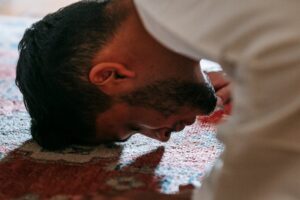Prior to the trip of Al-Isra’ and Al-Mi’raj, the prophet ﷺ and the companions prayed two types of prayers: Night prayers (Qiam Al-Layl), as mentioned in chapter (Al-Muzzammil), and a set of two Raka’at prayers, one in the morning and one in the evening. During the 13 years in Makkah and 17 months after migration to Madinah, the prophet ﷺ and the companions used to face Baitul Maqdis in Palestine as their Qiblah. But the prophet ﷺ always wanted his Qiblah to be Al-Bait Al-Haram or Al-Ka’bah. Even while facing Baitul Maqdis, he would have Al-Ka’bah in front of him so that he faced both in the same direction.
The changing of the Qiblah while in Madinah, and the journey of Al-Isra’ and Al-Mi’raj were two major events as a form of new tests to the companions of the prophet ﷺ. During the Makkah period, the tests were more in physical form; they faced constant persecution, abuse, torture, siege and were forced out of their homes. But these two major incidents in Madinah represented the tests within the mindset and their loyalty to revelation even if it seemed beyond natural matters like the journey of Al-Isra’ and Al-Mi’raj or shifting to a new direction in Salat. Scholars said that this was the first type of abrogation in Shariah (Nas’kh نسخ).
The believers followed quickly in accepting the new Qiblah. The narration stated that when a group of people were praying Asr, a person came and said: I testify that I just heard Qiblah has been changed! The Imam leading Salat turned 180 degrees walking back and all the people behind turned with him to face Makkah. Later a Masjed was built in that same spot in Madinah which is still in existence today called Masjed Al-Qiblatayn, or The Masjed of two Qiblahs.
Pagans in Makkah heard the news and were very excited. They said if Mohammad ﷺ went back to facing Makkah, then this must be a sign that he might drop his Islamic faith and follow our religion! While the People of the Book in Madinah were upset as the new Qiblah was shifted away from Jerusalem, and they started verbally attacking the prophet ﷺ saying if he was a true prophet, he would not have changed what the prior prophets were doing! The hypocrites also verbally attacked him saying that Mohammad ﷺ is not sure about his religion. One day he tells us to face something and another day he tells us to face something else!
Allah ﷻ revealed a verse answering all these doubtful matters: {To God belong the East and the West; He guides whomsoever He will to a straight path.} 2:142.
When this matter did not affect the prophet ﷺ and his companions, rumors started spreading around that the prayers of all the people who had died before the changing of the Qiblah, were wasted and in vain and all their rewards were lost! Allah ﷻ revealed another verse clarifying this matter and said: {But God would never leave your faith to waste – truly, God is All-gentle with the people, All-compassionate.} 2:143.
The idea of a new Qiblah towards Makkah represented many themes:
Connected Sahabah to returning to Makkah.
This shifting in Qiblah kept the idea of returning to Makkah fresh in the hearts and minds of Sahabah. Some scholars said this was a sign of the conquering of Makkah to come later on. It also meant to all Muslims till the day of Judgment that if the Prophet ﷺ was directed to face Baitul Maqdis before, it was to connect to all prophets and messengers prior to him in the Blessed and Sacred land of Palestine. But from the last Messenger ﷺ, purity is in the land Allah ﷻ chose as the first place a building was brought up for worshiping Allah ﷻ.
A sign of unity and security.
Muslims do not worship the Ka’bah, it is just a direction. Muslims worship only Allah ﷻ, and the direction towards Al-Ka’bah is to establish a sense of unity among Muslims around the globe. In other words, no one is ever really praying alone as he or she is always joined by millions praying from all around the world, facing the same direction, following the same movements and rituals. And that in itself is a feeling of security and unity, as well as a sense of connectedness spiritually.
A unique identity.
When Allah ﷻ told His prophet ﷺ {A Qiblah that pleases you}, it was answering the prophet’s prayers to establish a unique Ummah with a unique identity. Since our Ummah is the last with prophet Mohammad ﷺ being the last prophet, then it meant everything could be made in relation to the uniqueness of this Ummah.
In these blessed days of Rajab celebrating two major events in our Islamic history, Al-Isra’ wa Al-Mi’raj and the Qiblah changing, I pray we will all be proud of the legacy behind these two events and that it elevates our faith in our religion, Ameen.
Imam Kifah Mustapha




